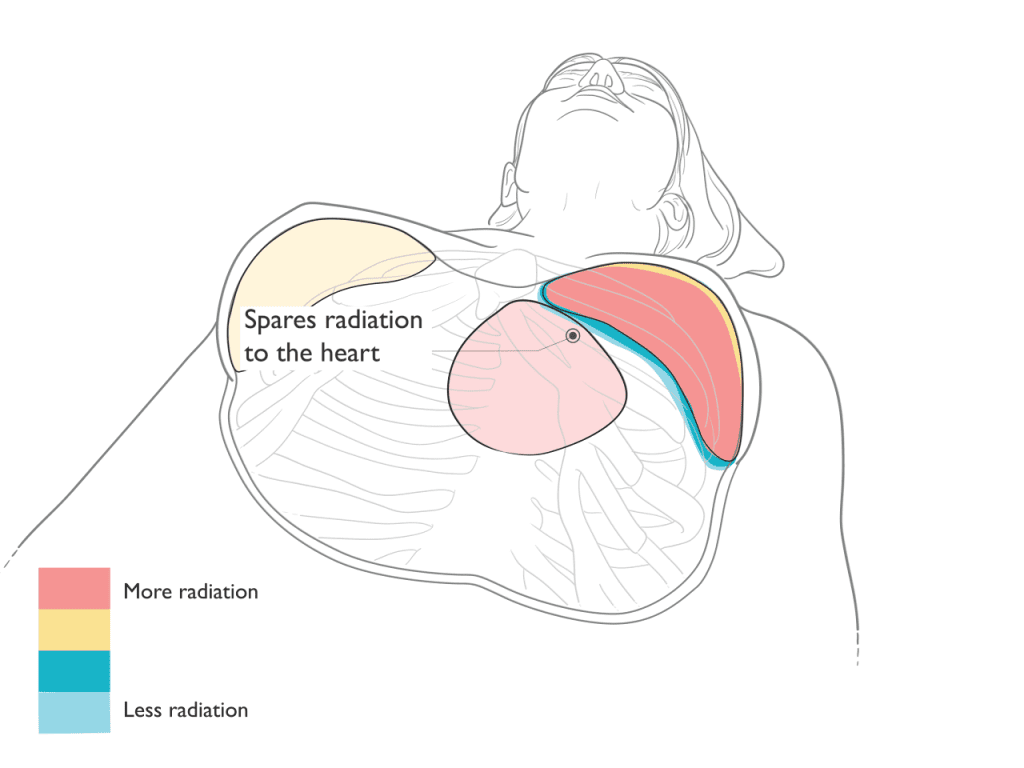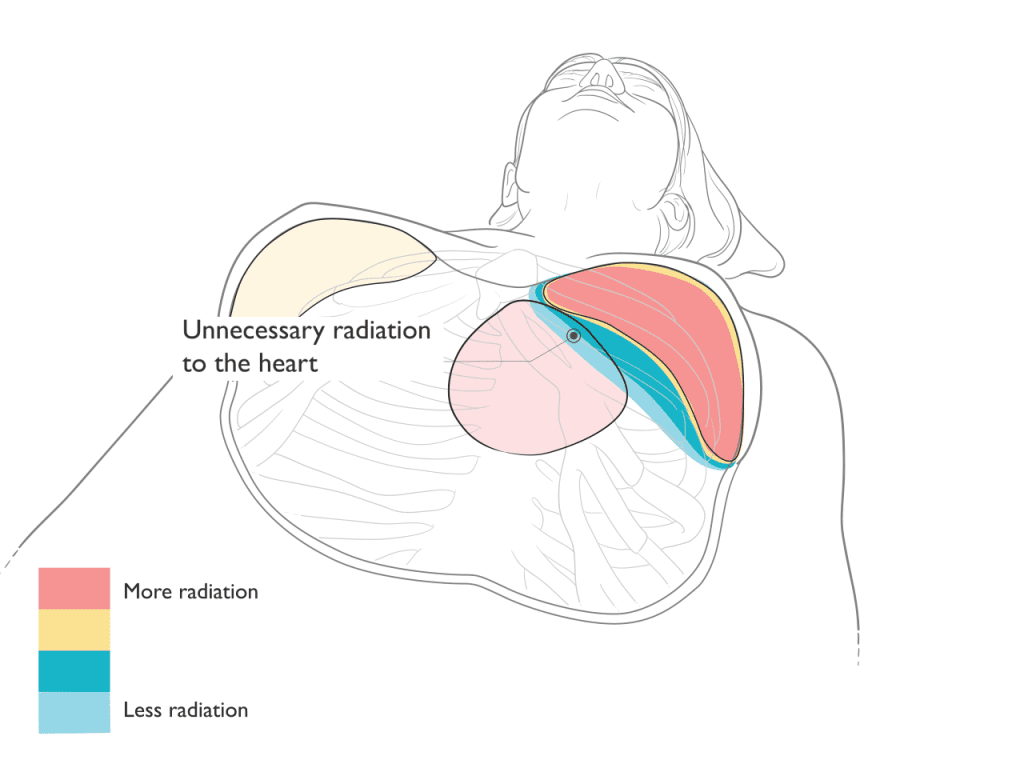Breast Cancer Treatment Overview
As the only National Cancer Institute-Designated Comprehensive Cancer Center in Georgia, Winship is at the forefront in the treatment of breast cancers. Our staff conduct innovative research and clinical trials that transform how these cancers are identified, treated, and survived.
The radiation oncologists at Emory Proton Therapy Center work with the multidisciplinary Emory Breast cancer team at Winship, which includes experts in surgical oncology, plastic and reconstructive surgery, breast medical oncology, breast radiology, pathology, medical genetics, supportive oncology, dieticians, social workers, physical therapy, and cancer rehabilitation. Your radiation oncologist will work closely with these and other specialists to customize your breast cancer radiation treatment plan and coordinate your care. We can also partner and coordinate with a patient’s existing care team, whether they are across town or around the world.
Proton Therapy for Breast Cancer
A breast cancer diagnosis can be one of the biggest challenges you and your family will ever face. Our team is dedicated to helping you meet that challenge through supportive care using the most advanced treatments available. Proton therapy for breast cancer may be a more precise radiation option for treatment of your cancer to help protect the function of important nearby organs like the heart and lungs, as well as reduce the risk of developing a future cancer. Our breast cancer specialists will work with you to develop a personalized breast cancer radiation treatment plan that aims for fewer side effects and improved quality of life.
What We Treat
- Ductal carcinoma in-situ (DCIS), a non-invasive breast cancer
- Invasive ductal carcinoma
- Invasive lobular carcinoma
- Triple-negative breast cancer
- Inflammatory breast cancer
- Recurrent breast cancer
- Angiosarcoma
- Re-irradiation
Breast Proton Radiation Oncologists

Dr. Vishal Dhere
Dr. Sunil Dutta
Dr. Karen Godette
Dr. Sagar Patel
Comparison of Proton and X-Ray Therapy
Proton Therapy
Proton therapy is an extremely precise form of radiation treatment that can often better focus the radiation to match the shape and depth of the target. After treating the target, protons stop, avoiding exit dose radiation through the body. By reducing or avoiding radiation to sensitive normal healthy tissues and organs, proton therapy may reduce some of the side effects that can occur as a result of radiation treatments.
https://vimeo.com/718425565
X-Ray Therapy
X-ray based radiation typically requires more beams or angles to deliver the radiation to the target. Unlike proton therapy where the radiation stops at the target, x-rays continue to deliver radiation as they exit through the body. As a result, x-ray based treatments typically result in increased radiation to normal healthy tissues and organs.
Proton Therapy Spares Radiation to the Heart


Benefits of Proton Therapy
In treatment of breast cancers, proton therapy can reduce or avoid radiation to surrounding healthy tissue and organs.
Depending on the tumor location and type, proton therapy for breast cancer may achieve the following benefits:
- Reduced risk of inflammation of the heart (pericarditis) and future heart problems like hardening of the arteries (atherosclerosis), stiffening of the heart muscle (fibrosis, cardiomyopathy), and heart attacks.
- Reduced risk of inflammation of the lungs (radiation pneumonitis), and problems with lung function (lung fibrosis).
- Reduced risk of difficulty or pain with swallowing (dysphagia or odynophagia) or chronic narrowing of the esophagus (stricture).
- Reduced radiation to the bone marrow and circulating lymphocytes, which may help support the function of the immune system in fighting cancer.
- Reduced risk of developing a future second tumor or cancer, which is most relevant in younger patients, those with a good prognosis and a long life expectancy, and those patients who may have genetic conditions putting them at higher risk for developing other cancers.
Schedule a Consultation
What to Expect With Proton Therapy
https://www.youtube.com/watch?v=LwNmHT1AFsE
Proton therapy is typically delivered once daily during weekdays, Monday through Friday. Most patients with breast cancer receive five to six weeks of daily radiation. Some patients may be eligible for shorter treatment courses that span over one to three weeks. Proton therapy is most often integrated with surgery, chemotherapy, hormonal therapy, immunotherapy, or other cancer treatments as part of a comprehensive plan of care.
Like other types of radiation, proton therapy treatments are invisible and painless. Most breast tumor treatments average 30 minutes each day in the treatment room.
Patients are seen by the radiation oncology physician team weekly during treatment to monitor progress, answer questions, address concerns, and manage any side effects from treatment. Your breast cancer radiation oncologist will discuss a plan to assess response to treatment and for long-term follow-up after therapy.
Studies on Proton Therapy in Breast Cancer
Our team has identified these studies as examples of the clinical benefits of proton therapy in breast cancer.
Phase II Study of Proton Beam Radiation Therapy for Patients With Breast Cancer Requiring Regional Nodal Irradiation
In this phase II clinical trial, 70 women with breast cancer who had undergone surgery and required radiation to the breast or chest wall and nearby (regional) lymph nodes were treated using proton therapy. Nearly all the women had left sided breast cancer, where it can be hard to protect the heart from unnecessary radiation when using x-ray based radiation techniques. Before and after proton therapy, women underwent a heart test called an echocardiogram as well as bloodwork to look at markers of heart strain to see if the proton radiation had any effect on the heart. The study found that 5-years after treatment, the chance of local breast cancer recurrence was less than 2%. There were no serious toxicities of lung inflammation and no changes in bloodwork or other tests to suggest any adverse effect on the heart.
Joint Estimation of Cardiac Toxicity and Recurrence Risks After Comprehensive Nodal Photon Versus Proton Therapy for Breast Cancer
This study compared the estimated risk of heart damage from radiation for women with left sided breast cancer who require radiation to the breast or chest wall and nearby (regional) lymph nodes. The risk of heart damage was compared between x-ray based techniques and proton therapy. While modern x-ray techniques can maintain a low risk of heart damage in many women, the authors found that proton therapy can reduce the predicted risk of cardiac toxicity by up to 2.9% and the risk of breast cancer recurrence by 0.9% in individual patients.
Proton pencil beam scanning reduces secondary cancer risk in breast cancer patients with internal mammary chain involvement compared to photon radiotherapy
This study compared x-ray and proton radiation techniques for breast cancer to evaluate the risk of developing a second cancer from unnecessary radiation exposure to the lungs and other normal tissues. The authors found that proton delivered using pencil beam scanning reduced the risk of secondary cancers compared to conventional x-ray techniques. These benefits were shown to be greatest for younger patients who required radiation treatment to the nearby (regional) lymph nodes.
Proton Accelerated Partial Breast Irradiation: Clinical Outcomes at a Planned Interim Analysis of a Prospective Phase 2 Trial
In this phase II clinical trial, 100 women with breast cancer who had undergone breast-conserving surgery (lumpectomy) and who required radiation therapy to the breast were treated with proton therapy. Treatment was to the partial rather than whole breast and was completed in 10 treatments over 5 days. At 1 year after proton therapy, 91% of women reported that the cosmetic appearance of their treated breast was “excellent” or “good”. At 2 years after treatment, 100% of women reported total satisfaction with the treatment and results. For women with left-sided breast cancer, the average radiation dose to the heart was extremely low at 0.02 Gy. There were no in-breast recurrences at 2 years after the treatment.
Patient Stories
Stephen, a 36-year old father from Columbus, Georgia, is one of the almost 2000 patients who have been treated at the Emory Proton Therapy Center since it opened in December 2018. He completed six weeks of proton therapy to treat a brain tumor.

Stephen
patient, brain tumor
Dusty was diagnosed with prostate cancer, an uncontrolled growth of cells in the prostate gland. Upon further consultation and research, he was treated with proton therapy and is excited to see an advanced form of radiation therapy is available at the Emory Proton Therapy Center.

Dusty
patient, prostate cancer
Proton therapy gave Zack his best shot at treating a spinal tumor that had come back. Zack was one of the first patients treated at the Emory Proton Therapy Center after it opened in 2018. The treatments, every weekday for six weeks, took less than one hour of his day and gave Zack the greatest odds of a long life with his wife and children.

Zach
patient, spinal tumor
Jill was diagnosed with salivary gland cancer and referred to Winship Cancer Institute of Emory University. She needed surgery, chemotherapy, and radiation therapy. A team of Winship experts worked together to coordinate her care, including proton therapy at the Emory Proton Therapy Center. Jill credits her care team for having the expertise and the necessary tools to give her the best cancer care possible.

Jill
patient, salivary gland cancer
Tony was diagnosed with prostate cancer in 2019 and sought care from experts at Emory Proton Therapy Center. He’s confident that the advanced radiation therapy gave him the best cancer treatment possible and says the comfort and care he got from Winship doctors and staff were unmatched. “There were many great solutions here in Atlanta, but the best to me was Emory Proton Therapy Center,” says Tony.

Tony
patient, prostate cancer


